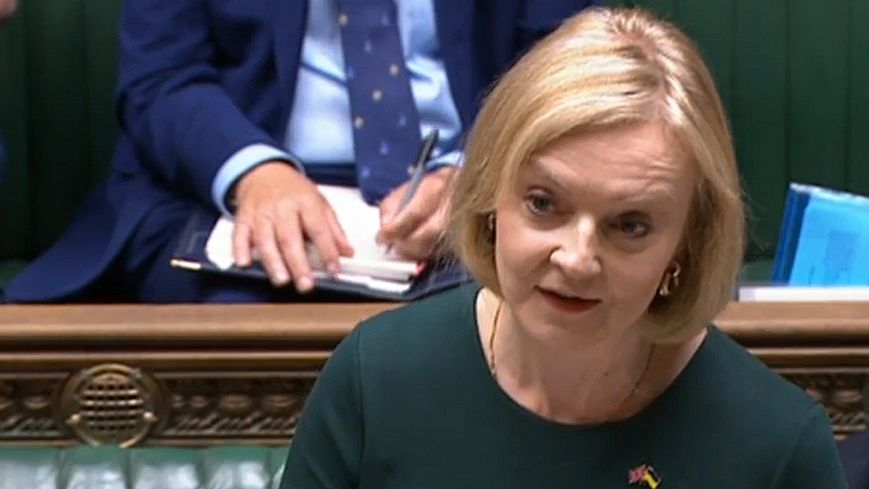 Getty Images
Getty ImagesBusiness groups have welcomed the government’s plan to ease the impact of soaring energy bills but have warned that uncertainty remains.
On Thursday, Liz Truss unveiled a plan to support both households and businesses with their energy bills.
Firms will see prices capped for six months and “vulnerable sectors” may get further support.
But some firms still have concerns, including about how much support they will get, and for how long.
Vicky Foster, who owns Studio 58 hairdressers in Penwortham, Preston, said her energy bills were going to jump from £277 per month to £890 under a new contract she’d had to negotiate.
Her hairdressing business has to keep the heating on during the cold winter months. “I’ve got customers sat with wet hair – they have to be kept warm,” she said.
Vicky said she’d had a “hugely stressful couple of months” trying to sort out her energy bills when her contract came up for renewal. She ended up taking a risk on a three year contract, as that seemed to be the most cost effective option.
“That’s what’s made me feel sick,” she said. “I’ve been waking up at night. I’ve not been this stressed in donkey’s years.”
If energy prices go back down Vicky is worried she will be stuck with an unaffordable energy bill.
And she has already had to pass the extra costs onto her customers.
“We’ve had to put the prices up,” she said. “It remains to be seen whether people will pay it.”
With the continuing squeeze on the cost of living, and people trying to make savings, “will they economise on hairdos?” she said.
Vicky added that it wasn’t clear yet whether businesses that have fixed their energy contracts will still get government help, and which businesses would be defined as “vulnerable”.

Rob Bowman, whose Refrigeration Specialists business puts together refrigeration services for industrial and commercial clients, said his energy costs had quadrupled in the past three years.
He said the government support will slow down the rise in energy bills, but they were still going to rise.
“It’s going to get worse rather than better,” he said. “It will be even worse in six months time. When that help is taken away the economy is just going to absolutely crumble.”
“I feel we’re on a big chute heading down into a big pit,” Rob added. “Small businesses need to stand up and say loud and clear that we are in trouble.”
Businesses will receive support for six months – is that enough?
The scheme to limit energy costs for businesses will be in place for six months, with a review in three months to see where support should be most targeted.
Households will get two years of support.
Businesses’ bills have not had a price cap in the same way households have. Some firms had warned that their energy bills could rise by up to 500% without a plan to ease the pressures.
And while the support for businesses could be extended, it is not certain for which industries, making cost planning difficult.
Arjan Geveke, director at the Energy Intensive Users Group (EIUG), which represents industries such as steel, chemicals and glass manufacturers, said he thought the six month period was based on the assumption that wholesale energy prices will fall back.
“But this might not necessarily be the case,” he said.
Wholesale energy prices have been soaring as economies recover from Covid, fuelled further by the war in Ukraine which saw Russia severely restrict its supplies of gas to Europe.
That’s pushed up the price of gas, including in the UK.
Meanwhile, the Federation of Small Businesses (FSB) has warned that firms could be in trouble once the support stops.
Chairman Martin McTague said: “This must not result in a cliff-edge after six months, with the withdrawal of support to all but ‘vulnerable’ targeted industries, sectors or types of business.”
What is a ‘vulnerable’ firm?
Announcing her plan to MPs, Ms Truss said that after the initial six months, “we will provide further support to vulnerable sectors, such as hospitality, including our local pubs”.
She added that she, together with Business Secretary Jacob Rees-Mogg, would work with business to review where the additional support should be targeted.
But it is not clear what defines a “vulnerable” company.
While there has been a focus on pubs, energy intensive industries have also called on the government to include them in a review.
Mr Geveke warned that the industries he represents would be put at a “significant competitive disadvantage internationally” if energy bills increased more.
The FSB said there needs to be a fair assessment of which firms should qualify for additional support at the three-month review.
“There’s talk of continuing to support vulnerable sectors or individual small businesses,” a spokesman told the BBC. “Well, an awful lot of them are vulnerable. In fact, all of them, if they’re using significant amounts of electricity.”
What happens if a firm has already fixed its energy costs?
Some businesses, such as Vicky Foster’s, have already agreed fixed price contracts at high prices in recent months.
At this stage, it is unclear what happens to them, although the BBC understands that the Department for Business will provide more details next week.
The government has said the support for businesses will be “equivalent” to the deal being offered to domestic customers, but it hasn’t given any further details at this point.
“There are still lots of detailed conversations going on with the government,” said Keith Anderson, chief executive of Scottish Power.
“Some of the details are still being worked through, and there’s lots more complexity in the business market because of the different types of companies, the different sectors they operate in, and the different contracts they’re on.
“But I think very soon we will be able to see the detail of that and we’ll be able to communicate that to each of the companies involved.”
The FSB said more information is needed.
“There are questions about what happens to people who have recently gone onto a fixed tariff that’s pretty high in price. Would they be able to benefit from this cap or would they be excluded from it?”, an FSB spokesman said.
“It sounds like a really big game changing moment to support small businesses who have been struggling with energy prices. But we do need more detail.”


